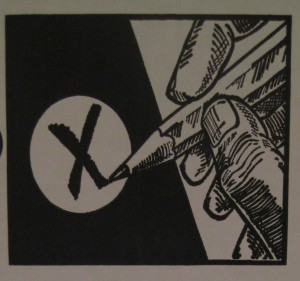“I care. I vote. But I favor none of the above.”
Last week Tuesday in Toronto party leaders hoping to lead Ontario participated in the only televised debate ahead of provincial elections on June 12. Highlights of that can be viewed here, as summarized by CBC. The whole 87 minutes is available here (or try this from YouTube.)
Tracking polls continue to indicate a close contest between the incumbent Liberal premier, Kathleen Wynne, and Tim Hudak of the Progressive Conservative Party. Andrea Horwath (NDP) has generally been coming in third place.
Races that feature more than two main parties are pretty common in Canadian politics. In this election Hudak’s prospects are helped by the fact Wynne and Horwath will split the non-conservative vote. Like it or not, the leader of Ontario’s Provincial Green Party, Mike Schreiner, was excluded from last week’s TV debate.
For many observers, though, one of the more interesting parts came at the very end of the presentation. That’s when moderator Steve Paikin said this: “…we encourage you – even if you decline your ballot – we encourage you to vote” (emphasis added).
The main message is totally mainstream, but what was that extra bit?
Well, at the provincial level in Ontario, a registered voter has the right to go to the polls, be issued his or her ballot – and hand it back, unused. Declined ballots get counted as a stand-alone tally. This is not to be confused with the spoiled ballot, which is also counted, without being applied to to results. The difference is this: declined ballots represent individuals who want to make a statement.
Elections frequently consist of imperfect choices. And then there’s the matter of strategic voting: not liking candidate X (or their party) at all – but detesting candidate Z even more. That’s the game we all know so well. But increasing numbers of voters hate what elections have become.
Advocates of declining one’s ballot say that action could send a more powerful (constructive?) message than simply staying home. That’s something people in Ontario are already doing in droves: in the last election held in 2011, turn out hit a record low of 48.2 percent. That time around the winner emerged with less than 20 percent of eligible votes. (And eligible votes is already a subset of the entire population of adult citizens.)
Poor voter turnout has become so normal that it can be dismissed as just one of those things. The option to take and decline a ballot would at least put people on record – numerically speaking. A formal statement, if you will: “I care. I vote. But I favor none of the above.”
Would that change the way candidates are selected, or the way campaigns are run? Or will those be totally wasted votes that will skew election results? (Mirroring an old – but still heated – argument in U.S. politics frequently leveled against the efforts of third-party candidates, like Ralph Nader.)
Well, fear not, politicians at large. For one thing, it’s not like candidates on the ballot would be denied office if “none of the above” votes out numbered regular votes. And the option doesn’t appear to be very widespread. Wikipedia’s entry on this topic is called “refused ballot” and only mentions Canada and Russia as places where this is currently practiced.
Looking for anything similar in the U.S. I came across a modest website with a proposal for something called voter nullification, which asks if voters shouldn’t have more power than government. That group proposes this Constitutional Amendment:
When a number of people equal to or greater than 10% of the people who voted in the last Presidential election sign a petition to nullify any action of the federal government including but not limited to laws, executive orders, and regulations, that action shall be voted on in the next election. If 50% or more of the voters vote against the action, it shall be nullified within 30 days of the election. When an action is nullified by a popular vote the government shall not take that action again for a period of 2 years from the date the action was nullified.
What do you think?
Nullification is a word often associated with anti-government factions. That’s not where I’m coming from for this discussion. I’m observing that voters of every political stripe across Ontario seem disengaged – or angry – about the electoral process, even among those who still bother to show up on election day. It seems like an unhealthy way to run a democracy and begs the question of what might make it better.
Of course this ignores the hot topic of money’s role in elections, which certainly is another crucial factor. But just looking at voting alone, are there ways to make that act more powerful and meaningful? Or do citizens already have the tools they need?
Tags: canada, elections, Ontario, Ontario election 2014, political reform, politics, refused ballots, voter nulification, voting









Basically, if it doesn’t matter, it doesn’t matter. The only way a none of the above would have any real impact would be if none of the above won a plurality of the votes, in which case there would be no winner declared and a re-vote run. The question becomes whether taxpayers will be interested in paying for one or more re-votes.
Update: Post-election stats from the Ottawa Citizen: “Declined ballots jump 1,300% in Ontario Election”
The National Post article on the same subject says “Ontario election 2014 saw highest number of declined ballots since 1975”
Overall voter turnout was 52.1% – up slightly from 2011’s dismal 48.2%.